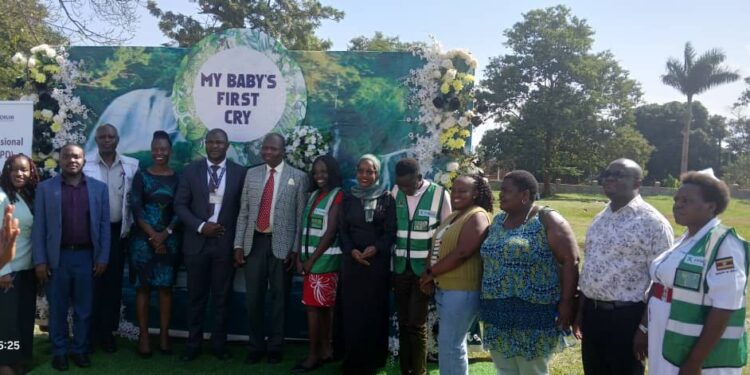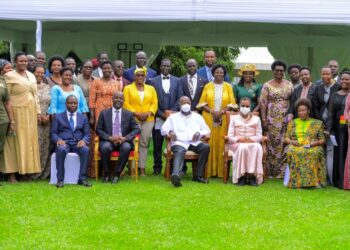Nangobi Joana Apio and Ruth Babirye Nyangoma (not real names), two expectant mothers from different walks of life, shared a common joy of awaiting the arrival of their babies. However, their experiences would take drastically different turns.
Nangobi Joana Apio, a 22-year-old housewife lives in the rural village in one of the districts in Busoga. When she went into labor, her family delayed seeking medical attention, hoping she would deliver at home.
After several hours of intense pain, they finally rushed her on a boda-boda motor cycle to the nearest health center about 46kilometres, where she was instead referred to Jinja Regional Referral Hospital (another 20kilometres away) but the journey was long and arduous due to poor roads.
Upon arrival, the health workers were busy with another emergency, and Joana Nangobi Apio was left waiting.
By the time she was attended to, it was too late. Her baby boy was born lifeless due to birth asphyxia, a result of the three delays: delay in deciding to seek care, delay in reaching the health facility, and delay in receiving care at the facility.
The loss was devastating for Joana and her family. “…If only we had acted faster and reached the hospital sooner…,” she lamented.
On the other hand, Ruth Babirye Nyangoma, a 30-year-old primary school teacher, had a different experience. She had planned her pregnancy carefully, attending antenatal care sessions regularly and following her doctor’s advice.
When she went into labor, her husband Julius Kayira Musoko (not real name) who is also a teacher in the same school quickly arranged for a vehicle to take her to Jinja Regional Referral Hospital, where she had been advised to deliver due to a detected risk factor.
The hospital staff were prepared and responded promptly, ensuring Ruth Babirye Nyangoma received the care she needed. Her baby girl was born crying loudly, and the medical team was quick to respond and provide necessary care.
The experience of Ruth Babirye Nyangoma was a stark contrast to Joana Apio Nangobi’s. “…I was lucky to have a supportive husband and access to good healthcare. I have realized how crucial it is to be prepared and proactive during pregnancy…,” Ruth said, grateful for the healthy birth of her child.
The stories of the two mothers highlight the importance of timely interventions during pregnancy and childbirth.
Birth asphyxia, a leading cause of newborn deaths, can often be prevented with prompt action and quality healthcare.
A baby’s first cry is more than just a sound, it represents a complex interplay of physiological, psychological, social and spiritual factors. It signifies a new born’s transition to life outside the womb.
In light of such stories, the Ministry of Health launched a national campaign to raise awareness about birth asphyxia at Jinja Regional Referral Hospital on Friday 27th June,2025.
The campaign, themed “My Baby’s First Cry,” aims to reduce neonatal mortality by promoting timely interventions and improving healthcare services.
Dr. Ronny Bahatungire, the Commissioner Clinical Services who represented Dr Charles Olaro the Director General of Health Services in a speech stressed the need for health workers to be prepared and responsive, saying, “Birth asphyxia is not worth celebrating — but a baby’s first cry is.
Dr Olaro says the ministry is committed to equipping health workers with the necessary skills to care for small and sick newborns.
He disclosed that a comprehensive in-service training program in newborn care has already completed its second cohort, with a third cohort set to start soon.
The training, which includes a one-month clinical placement at centers of excellence in newborn care, prioritizes nurses and midwives with diplomas.
Dr. Charles Olaro emphasized the importance of midwives focusing on the newborn before birth and having dedicated delivery room resuscitation teams within labor suites and theaters.
To further enhance newborn care, he says the Ministry of Health is working to functionalize neonatal care units in all general hospitals and regional referral hospitals.
He disclosed that networks of newborn care have been established within local maternity neonatal systems, with newborn coordinators overseeing regional activities.
Dr. Charles Olaro urged health workers to prioritize newborn care, emphasizing that every health worker plays a critical role in saving newborn lives.
He also stressed the importance of preparing newborn resuscitation kits in advance, just like delivery kits, to ensure timely interventions.
In his own unscripted speech, Dr Rony Bahatungire known among peers as a highly qualified medical professional with extensive experience in healthcare management and clinical practice gave a grim picture of how mothers often get frustrated at public health facilities and end up in fatalities.
“…we are the ones pushing mothers to these traditional birth attendants because of our actions but we should know that the money we get through extortions do not enrich but are instead a curse to ourselves and families…”, he warned.
He used the occasion to make a passionate plea to health workers in Busoga and country at large to adhere to the vacation of serving with love beyond self-interest to avoid infant and maternal mortality.
Dr. Bahatungire also emphasized that if extortion becomes institutionalized, it could have far-reaching consequences, affecting not just patients but potentially harming the health workers’ own families and relatives.
Borrowing from timeless wisdom, Dr. Bahatungire emphasized that “what goes around comes around,” cautioning that the consequences of such actions can be devastatingly personal.
To put his point across Bahatungire drew a powerful analogy, seemingly echoing the biblical principle of treating others with kindness and respect as recorded in Mark 12:31.
He quickly posed an emotional rhetoric, “…imagine the pain if a health worker’s parent, child, or relative were to suffer or even lose their life because they could not pay the bribes demanded by fellow health workers…”.
This stark scenario underscores the pervasive issue of extortion in healthcare facilities whose implications extend into the political sphere, where critics have long cited this issue to challenge the ruling National Resistance Movement (NRM) government led by Yoweri Museveni.
As can be recalled, over the weekend President Yoweri Museveni picked up nomination forms to secure the NRM flag, potentially extending his leadership until 2031 and marking 45 uninterrupted years in power.
Critics argue that the NRM government’s downfall, if it happens, may not stem from opposition political parties like NUP, FDC, UPC, DP, or the newly formed People Power Front (PPF), but rather from its own internal issues, including corruption, bribery, embezzlement of public funds, and absenteeism, which deny essential services to vulnerable Ugandans.
As the nation comes together to address this critical issue, stories like this one for Joana Apio Nangobi and Ruth Babirye Nyangoma serve as a reminder of the importance of awareness, preparedness, and quality healthcare in ensuring every baby’s first cry is a celebration of life.
A baby’s first cry is a unique exception where crying is a welcome sign, making it a joyous moment for parents and healthcare givers.
Do you have a story in your community or an opinion to share with us: Email us at editorial@watchdoguganda.com














